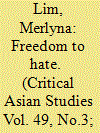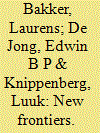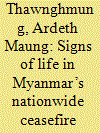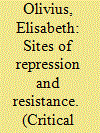|
|
|
Sort Order |
|
|
|
Items / Page
|
|
|
|
|
|
|
| Srl | Item |
| 1 |
ID:
153422


|
|
|
|
|
| Summary/Abstract |
Cambodia’s youthful population is significantly responsible for a recent unexpected decline in the popularity of the Cambodian People’s Party, which has governed since the end of the Khmer Rouge regime. This increasingly young electorate has lived through an era of peace and openness with regular multi-party elections and impressive economic growth resulting in rapid structural change in the economy. Compared to their parents’ generation, this younger generation is better educated, highly mobile, aspires to salaried employment, and is well connected to new sources of information and technology. Because of this, their expectations, aspirations, opportunities, as well as challenges they face are remarkably different from those of older generations. However, Cambodia’s institutions of governance, dominated by personalized and patron–client networks that have been propped up by the ruling elite, has effectively marginalized this emerging youth population. This marginalization from political and economic resources has produced alienation and discontent, which represents a significant political problem for the ruling party’s political strategies.
|
|
|
|
|
|
|
|
|
|
|
|
|
|
|
|
| 2 |
ID:
153423


|
|
|
|
|
| Summary/Abstract |
Empirically grounded in the 2017 Jakarta Gubernatorial Election (Pilkada DKI) case, this article discusses the relationship of social media and electoral politics in Indonesia. There is no doubt that sectarianism and racism played significant roles in the election and social media, which were heavily utilized during the campaign, contributed to the increasing polarization among Indonesians. However, it is misleading to frame the contestation among ordinary citizens on social media in an oppositional binary, such as democratic versus undemocratic forces, pluralism versus sectarianism, or rational versus racist voters. Marked by the utilization of volunteers, buzzers, and micro-celebrities, the Pilkada DKI exemplifies the practice of post-truth politics in marketing the brand. While encouraging freedom of expression, social media also emboldens freedom to hate, where individuals exercise their right to voice their opinions while actively silencing others. Unraveling the complexity of the relationship between social media and electoral politics, I suggest that the mutual shaping between users and algorithms results in the formation of “algorithmic enclaves” that, in turn, produce multiple forms of tribal nationalism. Within these multiple online enclaves, social media users claim and legitimize their own versions of nationalism by excluding equality and justice for others.
|
|
|
|
|
|
|
|
|
|
|
|
|
|
|
|
| 3 |
ID:
153418


|
|
|
|
|
| Summary/Abstract |
Changes in the nature, scale, and speed of natural resource extraction, especially in the last two decades, have resulted in many new resource extraction areas emerging across the world. By zooming in on Indonesia, this article shows that the underlying causes and consequences of current trends are more complex than portrayed by the rancher-squatter model of frontiers that is still frequently used to explain these developments. We argue that a broadened frontier notion is necessary to address the multifaceted nature of the processes underway in contemporary Indonesian extraction areas, as well as beyond. We propose a perspective that pays explicit attention to four new developments that can be described by using the hybridization of space, time, actors, and rules, and are characterized by the fact that these processes create new perimeters in all four mentioned areas. In so doing, we challenge, broaden, and renew the meaning of frontiers.
|
|
|
|
|
|
|
|
|
|
|
|
|
|
|
|
| 4 |
ID:
153419


|
|
|
|
|
| Summary/Abstract |
Regional economic integration has become the dominant development pathway promoted, endorsed, and followed by many developing country governments in South East Asia and globally. Focusing on hydropower development, this article shows how forces of globalization manifested in the Myanmar government’s strategies to promote economic growth are shaping the Salween River basin’s development trajectory. Contesting the general belief that economic development would help the country’s transition to full democracy and achieve peace, it illustrates how hydropower development plans in the basin are closely interlinked with human rights issues. Well known for its long histories of violent conflict involving the Myanmar military and ethnic armed groups in various states, hydropower development in the Salween River is not only linked to the ongoing peace process in Myanmar but could also have direct implications on the actual significance of the process. Despite the signing of nationwide ceasefire agreements in 2012, hydropower dam projects could contribute to and trigger reoccurrences of violent armed conflict. Recognizing this conflict-prone and politically fragile condition as the main characteristics of Salween water governance is essential if we are to strive for sustainable and just development.
|
|
|
|
|
|
|
|
|
|
|
|
|
|
|
|
| 5 |
ID:
153421


|
|
|
|
|
| Summary/Abstract |
This article focuses on peace-building efforts in Myanmar implemented under the Nation Wide Ceasefire Agreement (NCA) in 2013. It assesses the ways in which the recently elected government led by the National League for Democracy (NLD) has dealt with the NCA, and highlights opportunities and challenges. I argue that while the NLD government and Myanmar military remain crucial to the success of peace efforts, implementation of the NCA is impossible without the support of the eight current NCA signatories, in particularly the Karen National Union (KNU). Neglecting the importance of these actors not only provides an incomplete picture of ongoing peace-building efforts, but could also undermine efforts to promote national reconciliation that have thus far focused exclusively on the Myanmar government and the military. These signs of life emanating from the NCA signatories, however, have increasingly been undermined by an official failure to implement the agreement and to adhere to the agreed process and by ongoing hostilities between the military and four of the country’s ethnic armed groups.
|
|
|
|
|
|
|
|
|
|
|
|
|
|
|
|
| 6 |
ID:
153416


|
|
|
|
|
| Summary/Abstract |
Refugee camps are frequently perceived as spaces of emergency and exception. However, they are also spaces where millions of people live their everyday lives, sometimes for extended periods of time. As such, refugee camps are political spaces where struggles over the right to influence life in the camps and shape how they are governed are continuously ongoing. In this context, what are the opportunities for political participation for refugees living in camps? How and to what extent are refugees able to carve out political space where they can engage with and affect their lives and their situations? This paper addresses these questions through an analysis of refugee camps in Thailand. Drawing on Foucauldian analytics, the analysis demonstrates how key strategies employed to govern refugees, namely spatial confinement and development interventions are also creatively subverted by refugees and appropriated as bases for resistance and political mobilization. The article provides new insights into the relationship between power and resistance, demonstrating how specific technologies of governance create opportunities for subversion, reinterpretation, and appropriation.
|
|
|
|
|
|
|
|
|
|
|
|
|
|
|
|
| 7 |
ID:
153417


|
|
|
|
|
| Summary/Abstract |
This article traces the origins of legalized discrimination, religious hatred, and systematic marginalization of a community of Malaysian Muslims – the Shias – perpetuated in the name of Islam. It demonstrates how a central government-derived fatwa (religious legal opinion) banning Shi’ism and the propagation of Shia teachings in the country since 1996 has been used to justify a range of human rights violations, not limited to the religious freedom of this minority group. Apart from Syariah legislation, the state has utilized this fatwa alongside other tools, including the religious bureaucracy and the media, to persecute Shia in Malaysia. Anti-Shia efforts are also supported and propagated by non-state Islamists who often work hand-in-hand with state actors.
|
|
|
|
|
|
|
|
|
|
|
|
|
|
|
|
| 8 |
ID:
153420


|
|
|
|
|
| Summary/Abstract |
Thailand currently suffers from high levels of political polarization; parties associated with former Prime Minister Thaksin Shinawatra have won every election since 2001, based partly on strong support from voters registered in the populous North and Northeast regions. Many of these voters are migrant workers who spend much of their time working in Greater Bangkok, yet remain legal residents of their home provinces. This article argues that Thailand’s political polarization could be reduced if many of these “urbanized villagers” either took up formal residence in the capital city, or were encouraged to share in the creation of new small-scale urban communities in their places of birth.
|
|
|
|
|
|
|
|
|
|
|
|
|
|
|
|
|
|
|
|
|